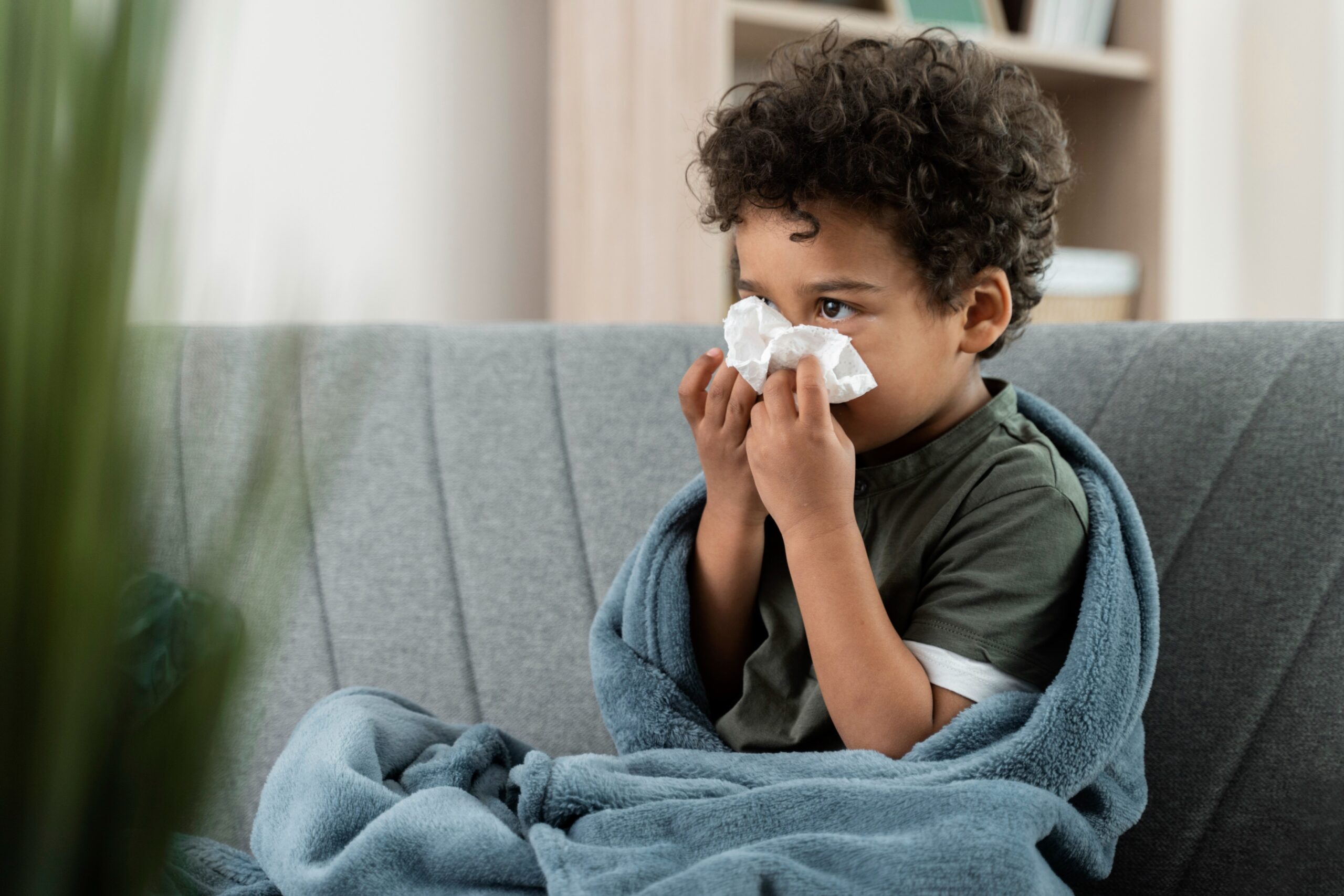Winter is a season almost everyone craves.
Though the season is liked by everyone as it is denoted as a magical season filled with chilly air, festive holidays, and cosy blankets but if we talk about children, it brings an increased risk of illness. The myth that follows in everyone’s mind is that cold weather makes you sick, but that’s not true at all. As soon as the months get colder, children usually spend more time indoors, making it a perfect situation to weaken their immune system. This makes the virus, germs, and bacteria easily spread all over.
As per the saying of Michael Lee, M.D., a pediatrician at Children’s Health℠ and Associate Professor at UT Southwestern, “Playing together inside means kids are in closer proximity to each other, sharing the air that could be contaminated with more germs, infections, and viruses.”
Some viruses thrive and can even spread better in the cooler, less humid air. Nasal mucus may be drier and stickier during the winter months, which some people believe can affect the spread of viruses. Lastly, if regular sleep or eating habits are interrupted during winter travel, the immune system may become more vulnerable and less effective in fighting infection.
Common Winter Illnesses in Children and Prevention Tips
A parent and caregiver to children, it is important for you to be aware of common winter ailments and take the right measures to protect their health. Let’s have a look at the most common winter illnesses among children and their preventive measures.
1. Common Cold
When we talk about illnesses in the winter season, one of the most frequent illnesses is the common cold among children. This is caused by various infections or viruses, which include rhinoviruses. The symptoms that follow the common cold are sore throat, coughing, sneezing, runny nose, congestion, and mild fever.
Prevention Tips:
- Make your children wash their hands more frequently with soap and water.
- Avoid getting in contact with sick individuals and ensure that your child does not touch their face.
- You should teach your children to cover their mouth at ht time of sneezing or coughing either with their hands or a tissue.
- You need to clean and disinfect all the toys, shared surfaces, and other commonly touched items.
2. Flu (Influenza)
The Influenza flu is another viral infection that spreads easily during the winter months. Symptoms include fever, body aches, sore throat, cough, and fatigue. Unlike the common cold, the flu can lead to more serious complications, especially for young children, the elderly, and those with weakened immune systems.
Prevention Tips:
- Get your child vaccinated against the flu each year. The flu vaccine is the most effective way to prevent infection.
- Ensure that children practice good hygiene, especially after being in crowded places or touching public surfaces.
- Keep your child home from school or daycare if they are sick to prevent the spread of illness.
- Make sure your child gets plenty of rest, eats a balanced diet, and stays hydrated to help maintain a strong immune system.
3. Respiratory Syncytial Virus (RSV)
RSV is a respiratory infection that can affect children of all ages, but it is particularly dangerous for infants and toddlers. RSV can cause symptoms like wheezing, a severe cough, difficulty breathing, and a runny nose. In more severe cases, RSV can lead to bronchiolitis or pneumonia.
Prevention Tips:
- Practice good hand hygiene and disinfect frequently-touched surfaces.
- Keep infants and young children away from crowded places or anyone who has cold or flu-like symptoms.
- Make sure your child’s vaccinations are up to date, as some vaccinations can help protect against severe respiratory infections.
- Keep your child warm and dry, as cold, damp weather can increase the chances of respiratory illnesses.
4. Ear Infections
Ear infections are another common illness among children, driven in the winter months, which is followed by respiratory infections and colds. A child may experience difficulty in hearing, ear pain, fever, and tugging at the ear. The major cause of infection in the ear is due to fluid buildup and bacteria in the middle ear.
Prevention Tips:
- You should keep your child’s head elevated when they are asleep, as it could help in draining fluid.
- You should keep your child’s immune system strong enough while making them do regular exercise and a nutritious diet.
- Moreover, your child should not be exposed to secondhand smoke as it increases the risk of ear infections.
- If your child is prone to ear infections, he should avoid exposure to cold water or wind, which can introduce bacteria into the ear canal.
5. Stomach Flu (Gastroenteritis)
Stomach flu is considered Gastroenteritis, which is mainly caused by viruses such as norovirus and rotavirus. This is influenced by symptoms such as stomach cramps, dehydration, diarrhea, and vomiting. It spreads quickly in places like schools and daycare centres.
Prevention Tips:
- You should wash your hands frequently, especially after using the bathroom, before eating, and after handling.
- Always try to clean and disinfect high-touch surfaces, which include countertops, light switches, and doorknobs.
- Make sure that the child stays hydrated, as diarrhoea and vomiting could lead to dehydration. Ensure that your child takes clear fluids like water or an oral rehydration solution.
- If you find your child has symptoms, you should keep them away from school or daycare to prevent the spread of illness.
6. Strep Throat
Strep throat is a bacterial infection leading to fever, sore throat, headache, and red, inflamed tonsils. Though strep tonsils are common in the winter season, they can occur at any time in a year. If you left them untreated, this could lead to serious complication, which includes rheumatic fever.
Prevention Tips:
- You should encourage your children to wash their hands regularly, especially at the time of coughing or sneezing and before eating.
- You must keep your child away from people who are diagnosed with strep throat until they are no longer contagious.
- Stop sharing your child’s personal items such as water bottles, utensils, or towels to minimize the risk of spreading of bacteria..
7. Dry Skin and Eczema
Winter air tends to be dry, which causes skin to get dry, cracked, and irritated, which leads to a condition called eczema. A lack of humidity can exacerbate various skin conditions, making it itchy and inflamed, especially among children with sensitive skin.
Prevention Tips:
- Use a humidifier in your home to add moisture to the air and prevent skin from drying out.
- Keep your child’s skin moisturised with thick, fragrance-free creams and lotions, particularly after bathing.
- Dress your child in layers and avoid wool or other irritating fabrics that could aggravate eczema.
- Encourage your child to drink plenty of water to stay hydrated and keep skin healthy.
8. Pneumonia
Pneumonia is a serious lung infection that can follow an upper respiratory infection like the flu or RSV. Symptoms include cough, fever, difficulty breathing, and chest pain. Pneumonia can be caused by bacteria, viruses, or fungi, and it can be very serious, especially for young children.
Prevention Tips:
- Ensure that your child receives all recommended vaccines, including those for pneumonia.
- Keep your child away from individuals with respiratory infections and practice good hygiene.
- If your child develops a persistent cough or difficulty breathing, seek medical attention promptly.
Conclusion
Winter can be a tough season for children’s health, with various illnesses circulating, but with the right precautions, you can help keep your little ones healthy and safe. Encouraging good hygiene practices, ensuring adequate nutrition and rest, keeping vaccinations up to date, and limiting exposure to sick individuals are key strategies for preventing common winter illnesses. If your child does get sick, prompt medical attention and care are essential to ensure a quick recovery. By taking these steps, you can help your child enjoy the winter months without being sidelined by illness.





